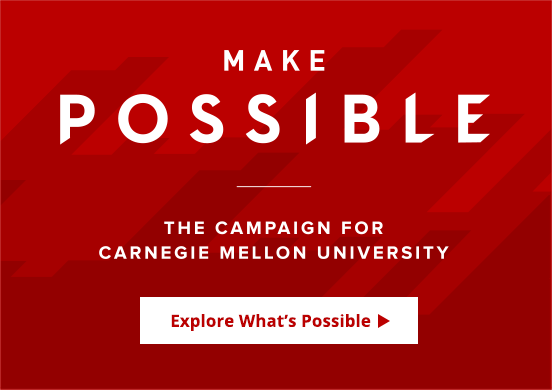Carnegie Mellon University Announces Landmark $2 Billion Campaign
- Marketing & Communications
- 412-268-1151
Carnegie Mellon University today announced a $2 billion comprehensive campaign —the largest in its history — that will accelerate the institution's leadership at the critical intersection of technology and humanity. Make Possible: The Campaign for Carnegie Mellon University will build resources to address society's greatest challenges and support educational initiatives across the institution.
"Our global society is at a pivotal moment, when technology is transforming every aspect of how we live, work, communicate and play. The expertise that our world needs right now is exactly what Carnegie Mellon does so well," President Farnam Jahanian said. "Make Possible is our community's philanthropic investment to advance our education and research mission, empower our students, faculty and staff, and benefit the lives of people across the planet."
Throughout its history, CMU has pioneered new fields and innovations that have become essential to the day-to-day lives of citizens around the world. Make Possible will create life-changing education, research and creative opportunities for its exceptional students; resources to bolster promising lines of inquiry for its renowned faculty; and an unparalleled university environment for the entire CMU community, today and into the future.
The campaign will make significant initiatives possible in four key areas that will advance the university's mission: accelerating technological advancements to benefit humanity; fueling artistic expression and creative inquiry to shape modern culture; achieving breakthroughs in discovery by transforming how scientific inquiry is pursued; and fostering a dynamic experience that enables CMU students to thrive throughout their lives. In addition to supporting university-wide aspirations, Make Possible will create resources that accelerate initiatives in each of CMU's seven colleges and schools.
"CMU has been a leader in some of the most important advancements and discoveries of our time, setting the pace for progress in the areas that will have the greatest impact on our lives," said David Coulter, a university trustee and alumnus who serves as campaign chair. "This is our collective opportunity to amplify our commitment toward our bold vision for the university's future."
“Make Possible is our community’s philanthropic investment to advance our education and research mission, empower our students, faculty and staff, and benefit the lives of people across the planet.” — President Farnam Jahanian
To date, more than 42,000 generous supporters have contributed more than half of the campaign's $2 billion goal during its quiet phase, fueling collaborative research across disciplines and supporting education and innovation.
Support for Make Possible already has transformed Carnegie Mellon and its colleges, schools and programs in measurable ways. So far, campaign donors have endowed 30 new faculty chairs across all schools and colleges, including the deanships for the College of Engineering, Dietrich College of Humanities and Social Sciences, and Mellon College of Science; and the headship of the School of Music. Those critical commitments allow CMU to attract and retain the brightest minds to its faculty, and support them with resources to advance research, creativity and discovery.
Last year, CMU celebrated the largest gift to scholarships in its history, a $50 million commitment from alumni Tod and Cindy Johnson. In addition, supporters have endowed 129 new scholarships and 94 new fellowships, assisting CMU to build a diverse group of scholars and opening the door for talented students to pursue a life-changing education. CMU donors also have supported initiatives to enhance the student experience, including new programs for student success, undergraduate research and civic engagement, among others.
Gifts to the campaign have helped to enrich the university's Pittsburgh campus through new and enhanced facilities, giving students and faculty an environment to learn, teach and explore in groundbreaking spaces. The dynamic learning environment of the new Tepper Quad was made possible by a $67 million lead gift from trustee and alumnus David A. Tepper, along with support from more than 1,200 donors. The space, home to the Tepper School of Business, has created a new model for higher education through an open design and commingling of teaching, collaboration and student support spaces.
"Make Possible: The Campaign for Carnegie Mellon" will accelerate CMU’s trajectory as the leader at the nexus of technology and society, empower our ambitious people and programs, and fuel innovations that will transform life for people around the world. Learn what you and Carnegie Mellon can make possible together.
Also located within the Tepper Quad is the Swartz Center for Entrepreneurship, made possible by a gift from alumnus Jim Swartz and his wife, Susan. The center is taking the renowned CMU entrepreneurial ecosystem to the next level with classes, mentoring, incubator space and access to startup funding.
The soon-to-open ANSYS Hall facilitates the university's maker culture with state-of-the-art spaces for simulation, prototyping and production. Construction also is underway for TCS Hall, an interdisciplinary research facility, and the university is in the planning stages for a new Scaife Hall for the College of Engineering.
Key campaign gifts are supporting CMU's leadership at the nexus of technology and humanity, including one that established the Block Center for Technology and Society, which facilitates interdisciplinary research into the consequences of technological change and creates meaningful plans of action. Critical endowments also have been established to support research in ethics and computational technologies, artificial intelligence, neuroscience, and advanced manufacturing.
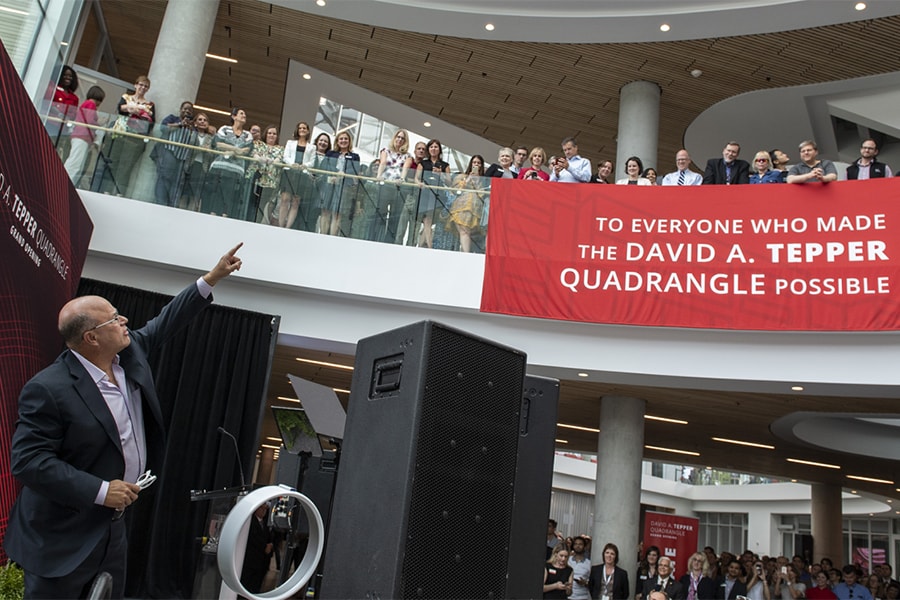
Alumnus David Tepper points at the assembled crowd during the Tepper Quad Grand Opening in September 2018.
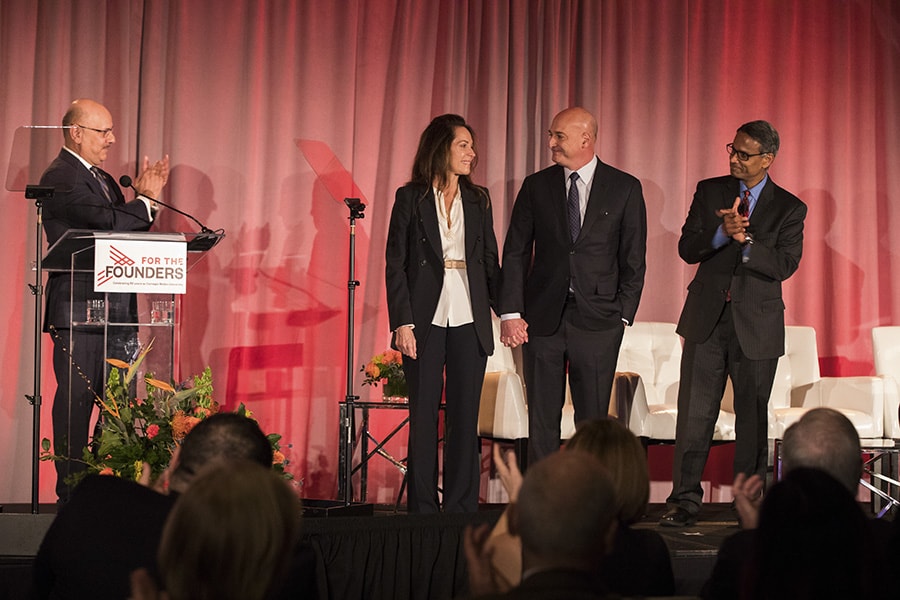
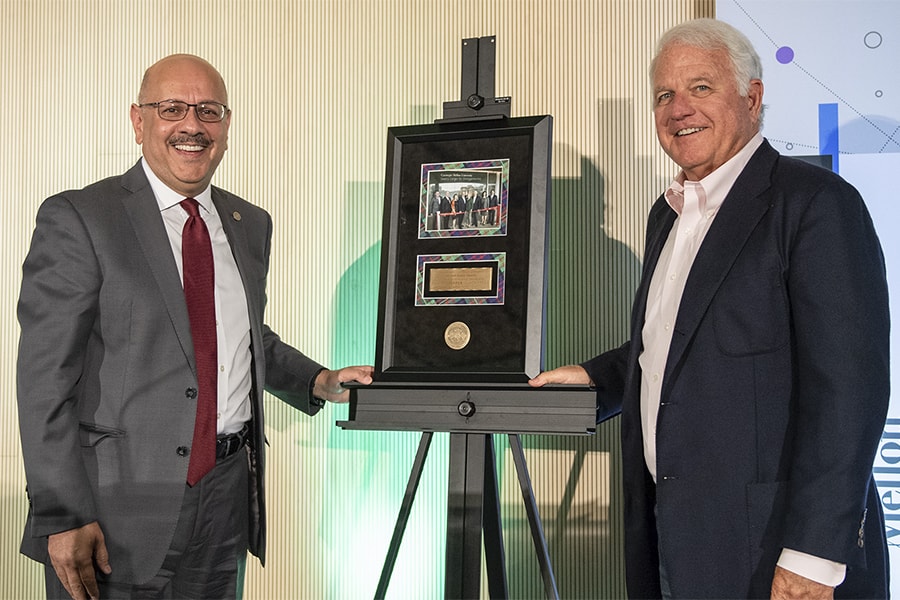
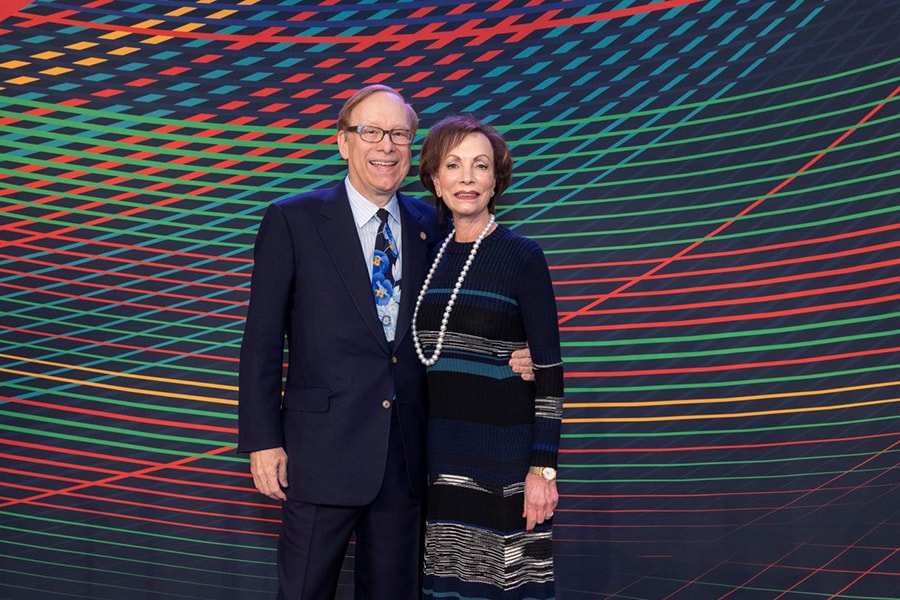
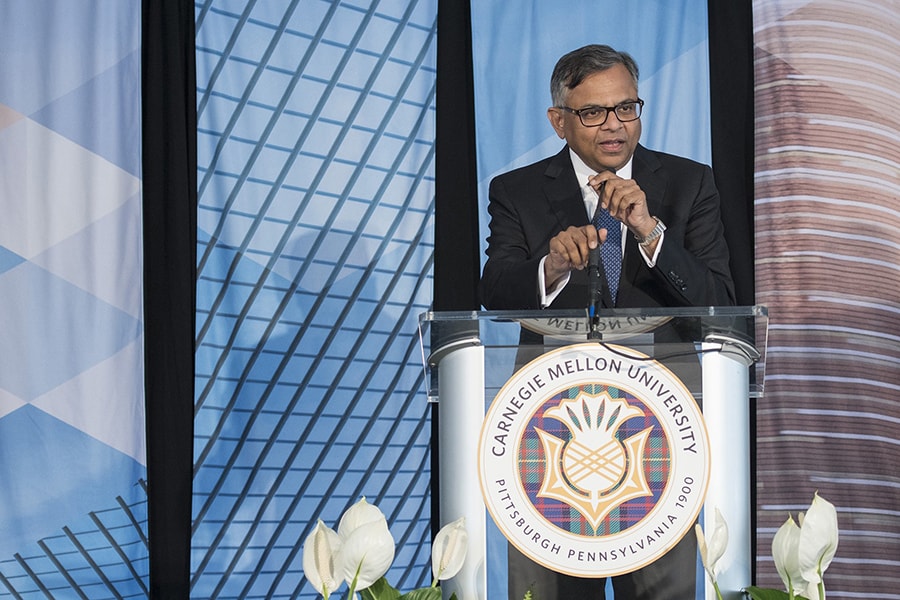
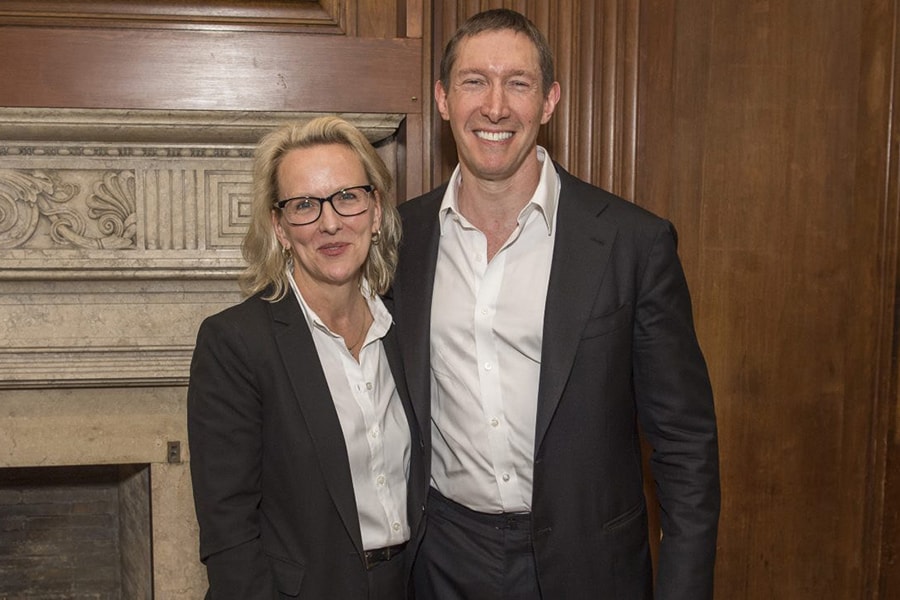
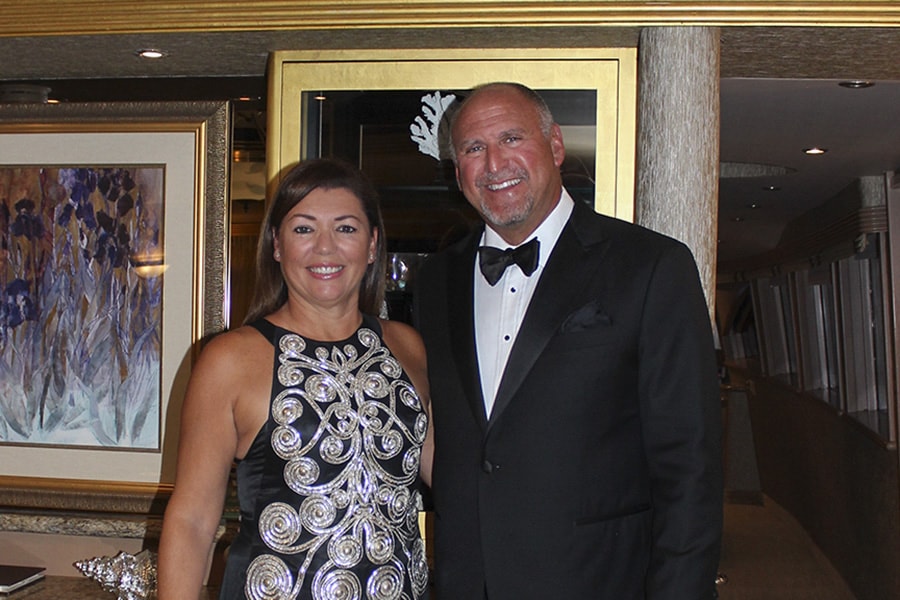
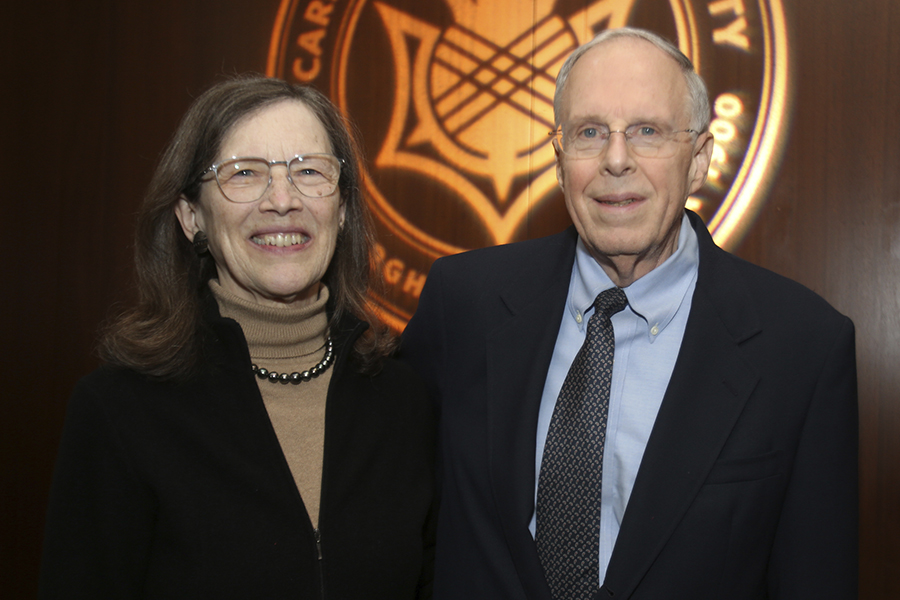
"The impact of the Make Possible campaign will be felt around the world, and that impact will begin here in our hometown," said James E. Rohr, chair of CMU's board of trustees. "Carnegie Mellon is proud of our Pittsburgh roots, and the campaign will bolster our commitment to the region's quality of life and economic growth through partnerships, workforce development and innovation."
The campaign will build on the university's momentum to advance work that addresses the most pressing issues of the modern era, from sustainability, energy, transportation and health care to data security, privacy and the ethical development of automation and artificial intelligence. CMU's unique collaborative and cross-disciplinary culture brings together scientists and business experts, artists and policy makers, humanists and engineers to tackle problems of great societal importance and create solutions with real-world impact.
"Every day, I am inspired by the tremendous talents and ambitions of our students, faculty, staff and alumni. This campaign will propel that work and amplify its impact to change the world," Jahanian said. "Through our groundbreaking contributions to society, the Carnegie Mellon community is writing the story of the 21st century. This campaign and our exceptional supporters will make possible an enduring legacy that will last for generations and reach far beyond our campuses' boundaries and into the world."
Discover what Carnegie Mellon University will make possible at makepossible.cmu.edu.
